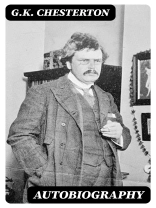In ‘Autobiography, ‘ G.K. Chesterton offers an introspective journey that weaves together elements of wit, philosophical inquiry, and rich narrative. Written with Chesterton’s signature paradoxes and humor, the text provides an elegant tapestry of memories, revealing his thoughts on faith, art, and the complexities of modern life. This autobiographical work stands out in the literary canon for its deeply personal yet universally resonant themes, reflecting a time marked by rapid change and disillusionment, allowing readers to ponder the interplay between individual identity and broader societal currents. G.K. Chesterton, a luminary of early 20th-century literature, was known for his prolific output as a writer, journalist, and philosopher. His experience as a convert to Catholicism profoundly informed his worldview, shaping his critiques of contemporary society and culture. Drawing on his childhood influences and philosophical musings, Chesterton’s journey imbues his autobiography with a sense of purpose, encouraging readers to grapple with existential questions reflecting his own life experiences and theological evolution. Readers are invited to delve into Chesterton’s ‘Autobiography, ‘ which serves not only as a memoir but also as a profound meditation on faith and reason. It is a compelling exploration for those seeking not just to understand the author, but to engage with the timeless dilemmas he faced. This book is a testament to the enduring capacity of personal reflection to illuminate the broader human experience.
เกี่ยวกับผู้แต่ง
G.K. Chesterton (1874–1936) was an English writer, poet, philosopher, dramatist, journalist, orator, literary and art critic, biographer, and Christian apologist renowned for his wit, distinctive style, and considerable influence on both popular and scholarly literature. His oeuvre spans a myriad of subjects and genres, offering insightful, often paradoxical critiques on complex themes of philosophy, ethics, and theology. With a prolific pen, Chesterton wrote around 80 books, several hundred poems, 200 short stories, 4000 essays, and several plays. His notable works include ‘The Innocence of Father Brown’, ‘Orthodoxy’, and ‘The Everlasting Man’. Chesterton’s autobiography, aptly named ‘Autobiography’, published posthumously in 1936, offers an intimate glimpse into the author’s life and thought processes. His writing style, characterized by a blend of humor, parable, and allegory, often satirized contemporary cultural mores and challenged readers to embrace a more imaginative and spiritual view of life. With his influence shaping such notable figures as C.S. Lewis and J.R.R. Tolkien, Chesterton’s enduring legacy remains evident in modern Christian thought and literature. His deft combination of intellect, faith, and humor ensures that his works continue to engage readers and scholars alike.












